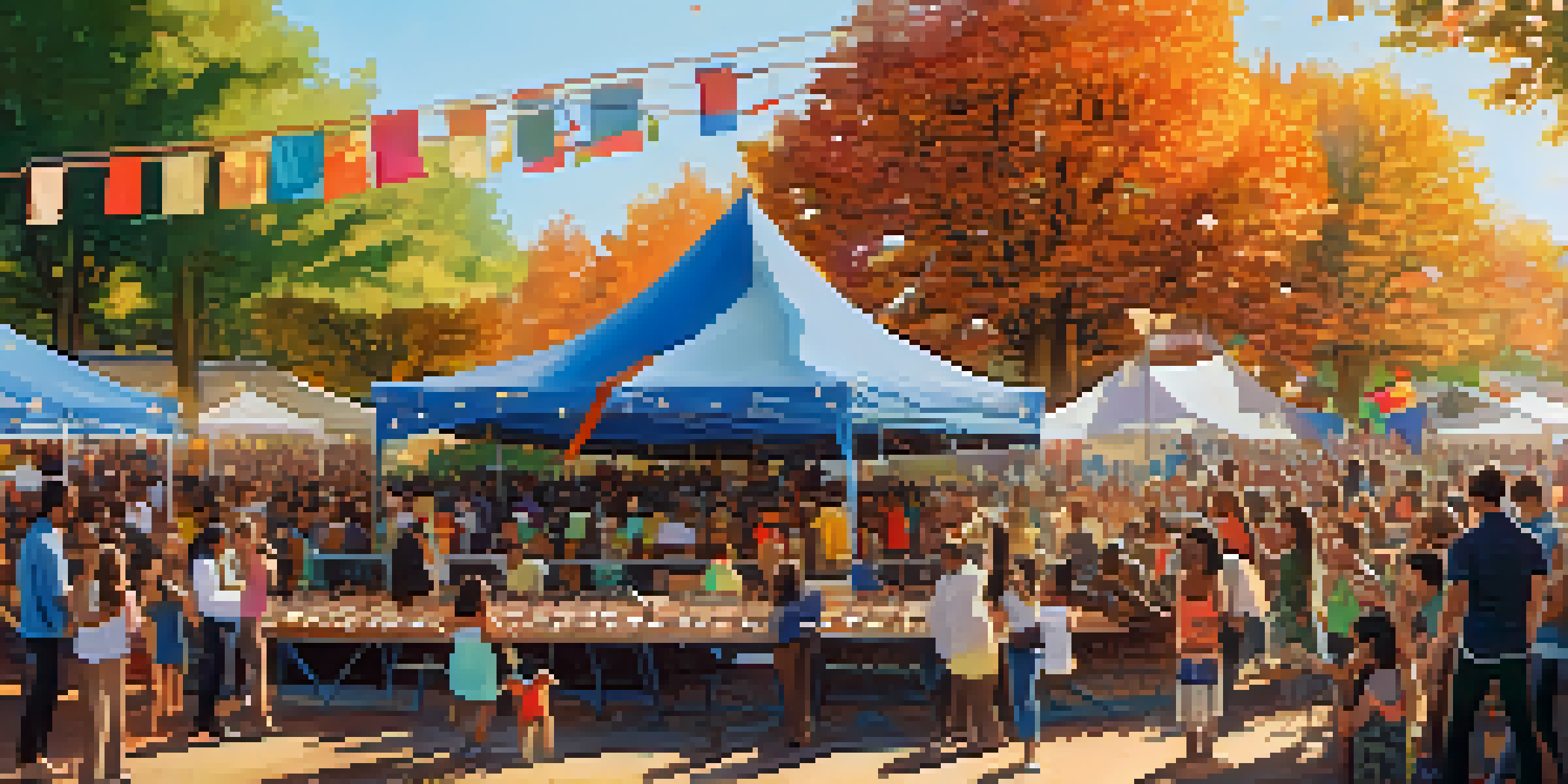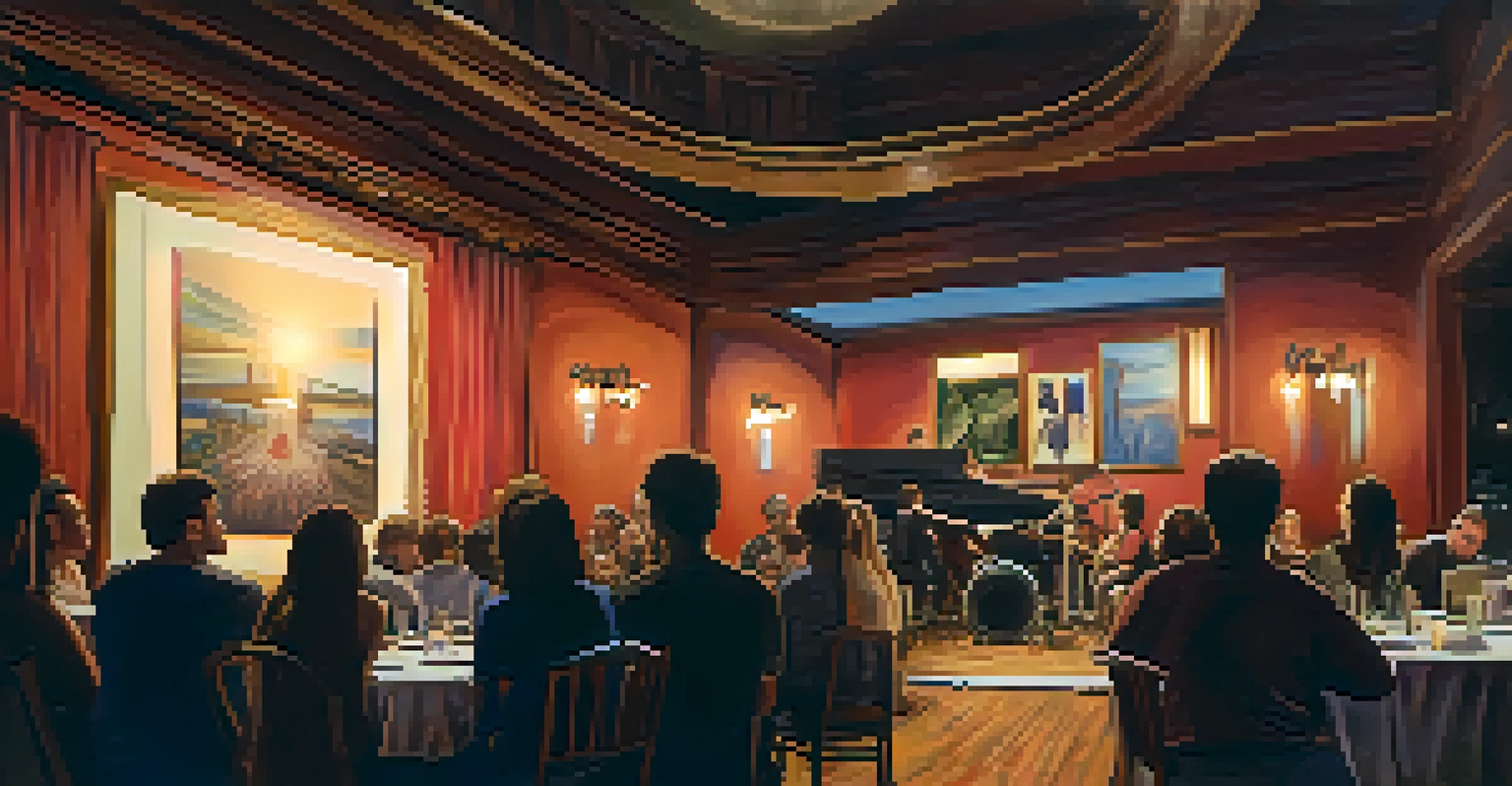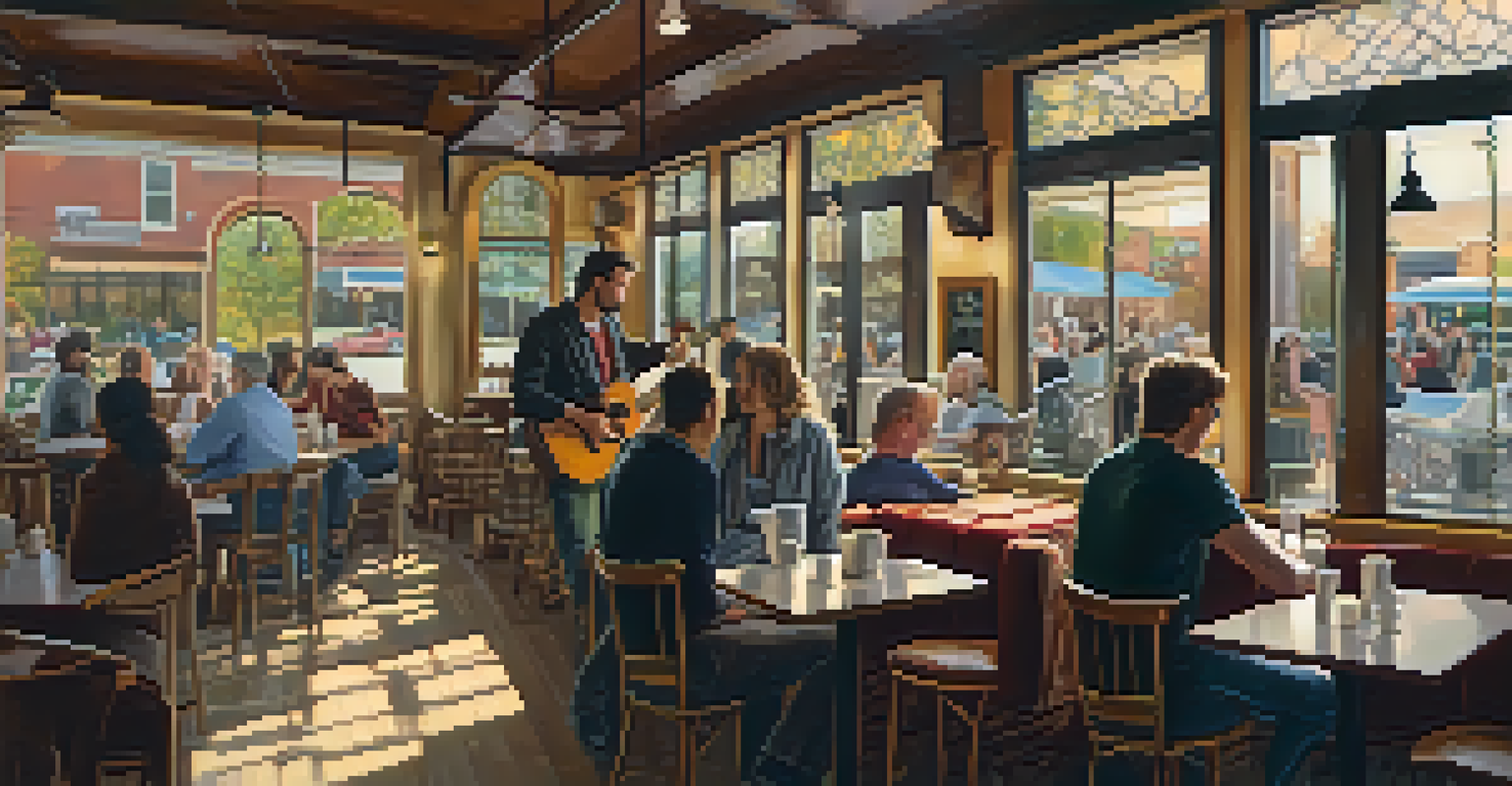The Role of Community in Supporting Local Music Artists

Understanding the Local Music Scene and Its Needs
Local music artists often thrive in environments where their community understands and values their contributions. These musicians bring unique sounds and stories that reflect their surroundings, creating a rich cultural tapestry. However, many artists face challenges such as limited exposure and lack of resources, making community support essential for their growth.
Music is the shorthand of emotion.
Communities play a pivotal role in shaping the local music scene by providing venues, audiences, and promotional platforms. When local music lovers attend shows and spread the word, they create a ripple effect that can elevate an artist’s visibility. This support not only helps individual musicians but also fosters a vibrant cultural identity in the community.
Moreover, community engagement can lead to collaborations among artists, creating new opportunities and enriching the local music landscape. By coming together, musicians can share their skills and resources, ultimately benefiting everyone involved. This interconnectedness is what keeps the local music scene alive and thriving.
The Impact of Local Venues on Music Artists
Local venues serve as the backbone of the music scene, providing spaces for artists to perform and connect with their audience. From cozy coffee shops to larger concert halls, these venues play a crucial role in shaping an artist's career. They offer a stage for musicians to showcase their talents and build a loyal fan base.

When communities support their local venues, they create an environment where artists can experiment with their music and grow. Regular gigs at these venues allow musicians to hone their craft and gain confidence in their performances. Plus, the intimate setting often leads to a more personal connection with the audience, making each show a memorable experience.
Community Support Boosts Local Artists
Local musicians thrive when communities actively engage by providing exposure, resources, and a supportive environment.
Additionally, venues can host events that spotlight local artists, increasing their visibility and helping them stand out in a crowded market. By promoting local talent, venues contribute to a sense of pride within the community, fostering a culture that celebrates homegrown music. This symbiotic relationship between venues and artists is essential for sustaining a vibrant local music scene.
Community Events: A Platform for Local Musicians
Community events, such as festivals and open mic nights, provide invaluable platforms for local musicians to showcase their talent. These gatherings not only draw in crowds but also create an atmosphere of celebration and support for the arts. They allow artists to perform in front of new audiences, which can lead to new opportunities and collaborations.
The beauty of music is that it connects people. It brings them together and creates a sense of community.
Moreover, these events often emphasize the importance of local culture, making them a great way for musicians to connect with their roots. When community members come together to celebrate local music, it fosters a sense of belonging and encourages artists to share their unique stories through their songs. This connection can make performances more impactful and resonate deeply with listeners.
In addition, community events can serve as a springboard for emerging artists, helping them gain traction in their careers. By participating in these events, musicians can network with other artists and industry professionals, opening doors to potential gigs and partnerships. Ultimately, these gatherings strengthen the bond between artists and their community, ensuring that local music continues to thrive.
The Role of Social Media in Building a Music Community
In today's digital age, social media plays a crucial role in connecting local musicians with their community. Platforms like Instagram, Facebook, and TikTok enable artists to share their music, promote events, and engage with fans directly. This accessibility helps create a sense of community, as supporters can follow their favorite artists’ journeys and cheer them on from afar.
Moreover, social media allows musicians to showcase their personalities and build a brand that resonates with their audience. By sharing behind-the-scenes moments, personal stories, and snippets of new music, artists can foster a deeper connection with their fans. This engagement can lead to increased loyalty and support, as fans feel more invested in the artist's success.
Local Venues Are Essential for Growth
Venues provide crucial spaces for artists to perform, connect with audiences, and experiment with their music.
Additionally, social media can amplify community events and initiatives, bringing attention to local talent. When musicians actively promote their shows and collaborations online, it encourages their followers to attend and support them. This interconnectedness creates a vibrant online community that uplifts and celebrates local music artists.
Networking: Building Relationships Within the Community
Networking is a vital aspect of a local music artist's journey, as it helps build relationships within the community. By attending events, collaborating with other musicians, and connecting with local businesses, artists can create a support system that bolsters their careers. These relationships can lead to valuable opportunities, mentorship, and even friendships.
Moreover, local musicians can benefit from the insights and experiences of those who have navigated the industry successfully. By engaging with seasoned artists and industry professionals, newcomers can gain knowledge about best practices and avoid common pitfalls. This exchange of information fosters a culture of collaboration and growth within the music community.
Ultimately, networking strengthens the local music scene, as artists unite to support one another. When musicians work together, they can pool their resources, share gigs, and help promote each other's work. This sense of camaraderie creates a thriving environment where everyone can flourish.
The Influence of Local Businesses on Music Artists
Local businesses play an important role in supporting music artists by providing sponsorships, venues, and promotional opportunities. Restaurants, bars, and shops can host live music nights or feature local artists in their marketing efforts. This collaboration not only enhances the business's ambiance but also creates a platform for musicians to gain visibility.
Moreover, local businesses can contribute to the financial stability of artists by paying them for performances and helping cover production costs. This support is essential for artists who often grapple with limited resources. By investing in local talent, businesses foster a sense of community pride and contribute to the economic growth of the area.
Diversity Enriches Music Communities
Inclusive music scenes that celebrate diverse genres and backgrounds foster unity and innovation among artists.
Additionally, when businesses actively promote local artists, they help cultivate a loyal customer base that appreciates homegrown talent. This mutual support creates a thriving ecosystem where local music can flourish, enriching the community culture. In essence, the partnership between artists and local businesses is a win-win for everyone involved.
Celebrating Diversity: The Power of Inclusive Music Communities
Diversity is a fundamental aspect of any thriving community, and this holds true for local music scenes as well. Inclusive music communities celebrate various genres, cultures, and backgrounds, allowing artists to express themselves authentically. This variety enriches the local music landscape and attracts a wider audience, fostering unity through shared experiences.
When communities embrace diverse musical expressions, they create opportunities for collaboration and cross-pollination of ideas among artists. This not only broadens the artistic palette but also encourages innovation and experimentation within the local scene. Musicians from different backgrounds can come together to create unique sounds that resonate with a wider audience.

Furthermore, celebrating diversity in music helps promote understanding and appreciation among community members. When people experience different musical traditions, they learn to appreciate the rich tapestry of cultures that exist within their own backyard. By supporting diverse artists, communities can create a more harmonious and inclusive environment where everyone feels valued.